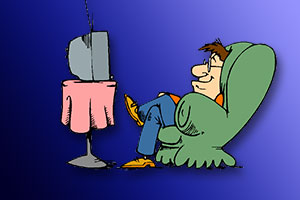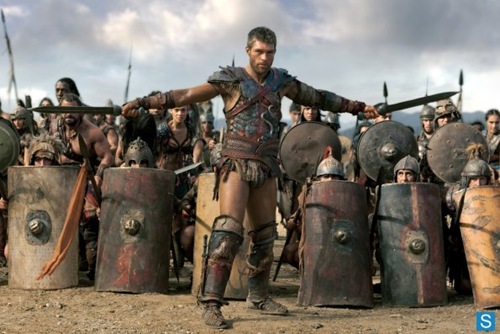来源:娱乐周刊
Would he live or die? That was the question heading into the series finale of Spartacus tonight. While history tells us the titular hero and his rebel forces were defeated by the might of Rome, some historians have claimed Spartacus’ body was never actually found, lending a glimmer of hope that the gladiator slave turned rebellion leader (originally played by the late Andy Whitfield and then by Liam McIntyre) might actually make it out of the series alive.
Those hopes were dashed when Spartacus, on the verge of killing Marcus Crassus, was speared by a solider from behind. After being carried off by Agron, he died peacefully as a contingent of former slaves he worked to free and protect indeed made it to safety. Other warriors like Gannicus — who was strung up on a cross and left to die — were not so fortunate. We spoke with Spartacus showrunner Steven S. DeKnight about why Spartacus had to die, why he died the way he did, and a whole other planned section to the finale we did not see. [NOTE: Also make sure to check out our finale post with Spartacus himself, Liam McIntyre, or just click on the video player at the end of the two page interview.]
ENTERTAINMENT WEEKLY: I remember when I spoke to you at the start of the season, I said, “Hey they never found Spartacus’ body on the battlefield,” and I wondered if you would use that as an out to have him not die — but nope, he’s dead.
STEVENDeKNIGHT: There was some minor debate, and I hear this from the fans nonstop, “Hey, they never found his body. We’d love to see him wonder off into the sunset.” My feeling is Spartacus incited this rebellion — thousands and thousands of slaves got killed. It would be disingenuous to have him walk off into the sunset. Plus, just the simple fact that he has nothing to walk off to. His love for his wife, which brings us all the way until the final scene of the series — his love for his wife and that loss really keeps him from ever having a life beyond this. His life really ended with her — any chance of a happy life, of a simple life. For him he was either going to win or he was going to die. There’s really no middle ground.
EW: And he couldn’t win.
DeKNIGHT: No he couldn’t win, but he came damn close.
EW: And you mentioned that there was some debate, and Liam mentioned it, too. What would that have looked like had Spartacus survived? Did you plan it at all?
DeKNIGHT: No, actually I was pretty adamant that he had to fall. Story-wise, it just didn’t ring true for me, that he slips away. I was also pretty adamant that somebody we cared about had to get away and carry on the story of Spartacus. But for me, with Spartacus it always needed that powerful ending, which I think is probably a little more in keeping with history. I don’t believe that Spartacus got away. I think if he did you would have heard from him again. He doesn’t seem the type of guy to slip quietly into the dark night, so I never really went down that path. From the beginning of the series, my plan has always been that he either dies on the battlefield and is carried off, or mortally wounded and carried off.
EW: Tell me about that decision to not have Crassus be the one to kill him. In fact, Crassus looked bested in that battle until the spear came through Spartacus’ midsection.
DeKNIGHT: That went through many different versions. The first version was we’d do a call-back to where Crassus was fighting the gladiator in episode one and he uses the same trick on Spartacus, and in an earlier draft it actually works and he runs Spartacus through. And we looked at it and some of us didn’t feel right about Crassus besting Spartacus in a fight, even though it was very clear that Spartacus was seriously wounded before the fight started. So we went round and round and finally settled on, “You know what would be cool? If Crassus does that same trick and Spartacus stops him and almost kills him.” Which was much better. And then I also wanted to mirror a little bit of how Crixus died, that basically these two giants died by being stabbed in the back. It gives it, just a little hint, of the cowardly Romans — that they can’t kill you straight on, these titans, these giants.
EW: I sort of felt that one of the main characters would end up dying on one of the crosses. It looked like it would be Agron a few episodes back. Tell me why you settled on Gannicus and talk about the way you made that scene really tragic and yet heroic?
DeKNIGHT: Yeah that’s another one. That scene was very difficult, I must have written six or seven different versions of that scene. Early on, he didn’t see Oenomaus in his final moments, he just started Spartacus’ name in defiance. And that worked okay, but ehhh, it needed something. So I added in seeing Oenomaus because I thought that really wrapped up everything Gannicus was always saying about seeing his brother again on the shores of the afterlife, and Oenomaus’ dying words saying him and Melitta would greet Gannicus in the afterlife. So I added that part and it worked pretty well.
And then really I think the master stroke came from our director Rick Jacobson, who really orchestrated that transition on the cross, the arena, and Gannicus returning to the only true home he ever had, the only place he ever felt he belonged, which was in the arena. And the combination of that, all those elements together, and then transitioning to Spartacus waking up was just such a one-two punch — it just really could not have worked better.
EW: I’ve always been amazed by the scale of this show, but this final battle scene was on a whole other level. The closest thing would be the arena collapsing. But this is just out-of-control. Tell me: was it daunting?
DeKNIGHT: Oh, yeah. I remember finishing the first draft of the script — the first draft was actually about 15 pages longer than the final draft. There’s an entire middle act of action that we cut out where Spartacus sets up this trap where they draw one of the legions of Crassus in and then the legion thinks they’re attacking Spartacus’ rag-tag village, but everyone has left and the place has been drenched in oil and they set it on fire and basically burn the legion. And originally that’s where Lugo dies, in the same way. But the script was way too long. We wanted to keep it in, but my feeling was it just kind of delayed what the episode was really about, so we had to snip that out and Lugo got to live a little while longer. But I remember handing in the draft of the script and my first thought was, “Well we’ll never be able to shoot this. I mean it’s just way too big for a TV schedule and a TV budget.” We had a lot of talks.
There were several different versions of that final battle, all with basically the same elements. But we finally got it down to a point where it was only just impossible to shoot and Rick Jacobson, the director, just did a phenomenal job. I think it’s the best work of his career. He really spearheaded it and somehow by cook with a little bit of crook, we got it all on the screen. I looked at it, quite frankly, and I’m shocked at the scale we were able to achieve, considering the amount of time we had to shoot it. I think it’s really unlike anything that’s ever been seen on television.
EW: That was a really nice touch with the final credits showing all the characters from the entire run of the show. Where did that idea come from?
DeKNIGHT: That was [exec producer] Rob Tapert’s idea, and I thought that was absolutely brilliant. He really, really wanted to give a nod to everybody who had had a speaking part on Spartacus and we also wanted to find a way to pay tribute to Andy in those final moments. And I’ve always loved the end credits on this show and I thought that was just the perfect way to go out.
EW: Finally, take me through your general thoughts as this journey of Spartacus the show comes to an end.
DeKNIGHT: When it was sold to Starz, it was very much sold as an R-rated action series, and as we started working on it, we started to layer in the bigger elements of love and romance and betrayal and intrigue and I think those storylines really became as important if not more important than the action. And it was just a joy to see it develop. By about episode four in the first season I think we finally really settled on what the show was and what it looked like and the action style, the directing style, the writing style. And from that point on, it was pure joy to work on.
We received an incredible amount of latitude from Starz, especially in that first season where they let us do pretty much whatever we wanted because they had this amazing trust in us. A lot of people out there who don’t watch this show think it’s that soft-core, really violent trashy gladiator show, but we always were shooting for something more. We were always shooting for a deeper emotional story. And I’m very proud of that story we’ve told and I could not be prouder of the finale. Ending a series is always a monumental task and many a greater man than I have stumbled ending a series but in this case I just think it just all came together beautifully.

 天涯飘萍生(Donatino),《天涯小筑》的作者兼创始人,资深博客作家,在国内较早开展英语电视剧集(美国、加拿大、英国和澳大利亚剧集)的介绍、新闻翻译、点评及推广等工作,并写有大量电视知识专题介绍文章。代表作品包括:《科幻与电视》、《美剧入门》、《一部电视剧集是怎样“炼成”的》、年度《年终特稿》、年度《节目完全指南》等。从2006年至今,天涯飘萍生翻译了95%英语电视剧集的专题介绍资料和官方新闻稿,转发了90%英语电视剧集的预告片、片花、花絮、访谈和宣传片等视频。天涯飘萍生还曾参与字幕翻译工作,代表作品包括:《暗域魔舰》、《探索者传说》、《时间旅人》、《星际之门:宇宙》、《远古入侵》、《梅林传奇》、《恐龙帝国》、《无敌女金刚》、《异种战士》、《武神公主西娜》、《巴克罗杰斯在二十五世纪》等。
天涯飘萍生(Donatino),《天涯小筑》的作者兼创始人,资深博客作家,在国内较早开展英语电视剧集(美国、加拿大、英国和澳大利亚剧集)的介绍、新闻翻译、点评及推广等工作,并写有大量电视知识专题介绍文章。代表作品包括:《科幻与电视》、《美剧入门》、《一部电视剧集是怎样“炼成”的》、年度《年终特稿》、年度《节目完全指南》等。从2006年至今,天涯飘萍生翻译了95%英语电视剧集的专题介绍资料和官方新闻稿,转发了90%英语电视剧集的预告片、片花、花絮、访谈和宣传片等视频。天涯飘萍生还曾参与字幕翻译工作,代表作品包括:《暗域魔舰》、《探索者传说》、《时间旅人》、《星际之门:宇宙》、《远古入侵》、《梅林传奇》、《恐龙帝国》、《无敌女金刚》、《异种战士》、《武神公主西娜》、《巴克罗杰斯在二十五世纪》等。














